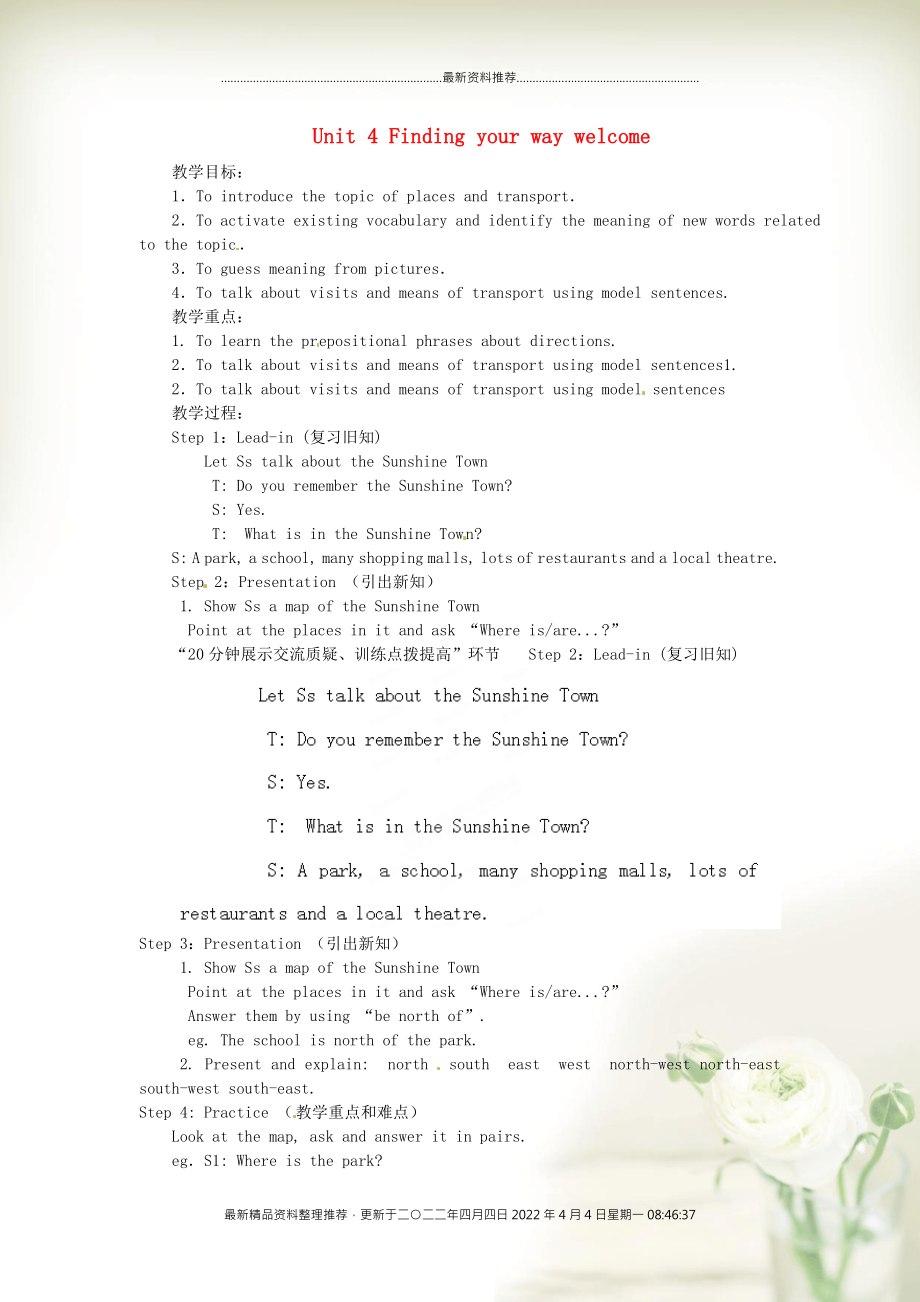《江蘇省泰興市新市初級(jí)中學(xué)七年級(jí)英語(yǔ)下冊(cè) Unit 4 Finding your way welcome教案 (新版)牛津版》由會(huì)員分享����,可在線閱讀,更多相關(guān)《江蘇省泰興市新市初級(jí)中學(xué)七年級(jí)英語(yǔ)下冊(cè) Unit 4 Finding your way welcome教案 (新版)牛津版(3頁(yè)珍藏版)》請(qǐng)?jiān)谘b配圖網(wǎng)上搜索��。
1、……………………………………………………………最新資料推薦…………………………………………………
Unit 4 Finding your way welcome
教學(xué)目標(biāo):
1.To introduce the topic of places and transport.
2.To activate existing vocabulary and identify the meaning of new words related to the topic.
3.To guess meaning from pictures.
4.To talk about visits and
2����、means of transport using model sentences.
教學(xué)重點(diǎn):
1. To learn the prepositional phrases about directions.
2.To talk about visits and means of transport using model sentences1.
2.To talk about visits and means of transport using model sentences
教學(xué)過(guò)程:
Step 1:Lead-in (復(fù)習(xí)舊知)
Let Ss talk about
3、the Sunshine Town
T: Do you remember the Sunshine Town?
S: Yes.
T: What is in the Sunshine Town?
S: A park, a school, many shopping malls, lots of restaurants and a local theatre.
Step 2:Presentation (引出新知)
1. Show Ss a map of the Sunshine Town
Point at the places in it an
4�、d ask “Where is/are...?”
“20分鐘展示交流質(zhì)疑�、訓(xùn)練點(diǎn)撥提高”環(huán)節(jié) Step 2:Lead-in (復(fù)習(xí)舊知)
Step 3:Presentation (引出新知)
1. Show Ss a map of the Sunshine Town
Point at the places in it and ask “Where is/are...?”
Answer them by using “be north of”.
eg. The school is north of the park.
2. Present and explain:
5��、north south east west north-west north-east south-west south-east.
Step 4: Practice (教學(xué)重點(diǎn)和難點(diǎn))
Look at the map, ask and answer it in pairs.
eg.S1: Where is the park?
S2: The park is south-west of the schoo1.
S1: Where is the zoo?
S2: The zoo is north of the school.
… …
Step 5: Welcome to
6���、the Unit
1. T: The Class 1, Grade 7 Ss are planning a class trip. Read the instructions. Look at the map and find the places they plan to visit. Then write the numbers in the boxes.
2. T: Simon and Daniel are talking about the trip. Listen to the tape and answer these questions.
(1) Where are
7、they going for the trip?
(2) Where’s the zoo?
(3) How will they get there?
3. Repeat the conversation after the tape.
4. Work in pairs and make dialogues, think of more forms of transport or places they can visit��。(eg����,taxi���, bicycle��,car,bus����,underground��,plane etc.) (小組合作, 鍛煉口語(yǔ))
S1: Where is
8����、Sunshine Park?
S2: it’s north-east of our school.
S1: Let’s go there.
S2: Good idea.
S1: How can we get there?
S2: We can get there by bus/ on foot. (教學(xué)重點(diǎn))
Step 6: Comic strips
1. T: Eddie and Hobo also get a map. They want to go somewhere.
Q: Do they know the way?
2. Listen to t
9�、he tape then answer the question by their words.
3. Then listen and repeat.
4. Read and answer more questions:
(1) Where are Hobo and Eddie?
(2) Can Eddie go down the hill?
(3) What does the sign say?
5. Read and act it out. (小組合作��, 鍛煉聽(tīng)力和口語(yǔ))
Step 7: Language Points(總結(jié)和鞏固新知)
1. Foll
10����、ow me, Eddie. I know the way. 埃迪,跟我來(lái)�����,我認(rèn)識(shí)路��。
follow sb. 跟隨某人 For example :
不要跟著他上山。Don’t ______ him up the hill.
冬去春來(lái). Spring __________ winter.
2. Sunshine Zoo is north of Sunshine Middle School.
英語(yǔ)中的方位名詞有: 東east 西west 南south 北 north
東南____________ 東北____________
西南__________ 西北_
11���、____________
☆ 在方位名詞后加ern, 構(gòu)成方位名詞的形容詞形式。即:
東部的_________ 西部的_________
南部的_________ 北部的___________
【 指點(diǎn)迷津】 A在B東 應(yīng)如何表達(dá)
(1) A地包括在B地的范圍內(nèi)�����。 A is in the east of B .
(2) A地和B地相連 A is on the east of B .
(3)A地不包括在B地的范圍內(nèi)。 A is to the east of B .
山東在中國(guó)的東部���。
Shandong is __
12、____ the east of China.
日本在中國(guó)的東面��。
Japan is _____ the east of China.
海門(mén)在啟東的西邊����。
Haimen is _____ the west of Qidong.
3. Are you sure, Hobo ? 你肯定嗎���,霍波?
be sure 確信��,有把握
(1) be sure to do sth. 表示說(shuō)話(huà)人推測(cè)“一定����,必然會(huì)”���。
天肯定會(huì)下雨。It _____ ______ ______ rain.
(2) be sure of sth. 感到“有把握���,確信
13����、”。
他確信他會(huì)成功����。
He ______ ______ ______ his success .
(3) be sure + that從句�����,確信……
我確信我能比你跑得快��。
I’m ________ ________ I can run faster than you .
4. Don’t be afraid. Come with me. 不要怕,跟我來(lái)����。 be afraid 害怕
(1) be afraid of (doing) sth. 害怕(做)某事��,表示“怕……”“擔(dān)心……”
這個(gè)小孩怕狗��。
The little boy ______ _______ __
14、____ the dog .
(2) be afraid to do sth. 害怕做某事���,著重指“因害怕而不敢做某事”。
夜間他不敢獨(dú)自外出�����。
He _____ _____ _____ go out alone at night .
(3) be afraid ( that ) 從句表示“引出不好的消息或帶有歉意的回絕:����。
抱歉,我恐怕幫不了你�����。
I ______ ______ ______ I can’t help you.
5. Show your friends how to get to your home.
疑問(wèn)詞where , what , how , which 等可以和動(dòng)詞不定式(to do)連用,構(gòu)成不定式短語(yǔ)���,可以在句中作賓語(yǔ)。
我不知道要去哪里�。
I don’t know ___________ ______ ______ .
你能告訴我怎樣使用電腦嗎����?
Can you tell me _____ _____ ______ the computer?
你知道做什么嗎��?
Do you know _______ _______ ________ ?
最新精品資料整理推薦�����,更新于二〇二二年四月四日2022年4月4日星期一08:46:37
 江蘇省泰興市新市初級(jí)中學(xué)七年級(jí)英語(yǔ)下冊(cè) Unit 4 Finding your way welcome教案 (新版)牛津版
江蘇省泰興市新市初級(jí)中學(xué)七年級(jí)英語(yǔ)下冊(cè) Unit 4 Finding your way welcome教案 (新版)牛津版

